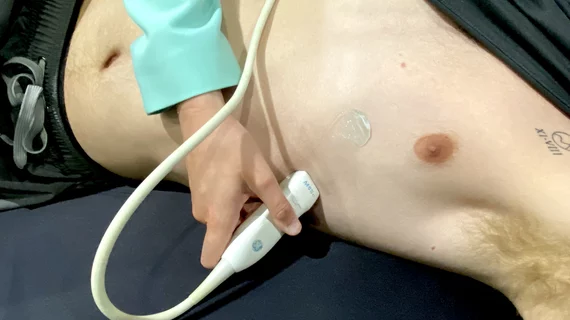Survey highlights portable ultrasound adoption trends, challenges
Exo, a medical imaging software and device company, has unveiled its 2023 survey report, focused on the expansion of point-of-care ultrasound (POCUS) in hospitals and primary care settings. The survey was conducted by Sage Growth Partners back in June, and the results are based on responses from over 150 U.S.-based physicians. Their opinions provide a window into POCUS adoption trends, the perceived value of handheld devices, and the impact of artificial intelligence on medical imaging.
Overall, the report reveals that despite the myriad of medical benefits of POCUS systems, adoption remains limited. Challenges identified in the Exo report include poor image quality and integration issues with hospital IT systems, hindering effective training and documentation. Other key details on what respondents had to say are below.
Wasted scans and lost revenue
There is waste associated with use of ultrasounds, signaling a need for better policy at healthcare organizations. According to the survey results, only 68% of ultrasound exams are documented, posing compliance and legal risks, and a significant portion of billed exams go unaccounted for, resulting in revenue losses for health systems. Survey respondents said around 50% of ultrasound scans end up being billed.
Need for more handheld devices
Respondents to the survey overwhelmingly believe that the availability of handheld POCUS will drive increased adoption. Handheld POCUS devices emerge as a solution to improve care accessibility, particularly in underserved communities. With their simplicity and lower cost compared to cart-based systems, handheld devices can enhance diagnostics and treatment, leading to better patient outcomes.
AI is the future
Survey respondents overwhelmingly believe AI to be necessary to boost ultrasound adoption in any clinical setting. AI-equipped POCUS devices are capable of tapping into extensive databases of ultrasound images, assisting caregivers in image capture and interpretation. Survey participants express optimism about AI's positive impact on POCUS, with expectations that it will streamline image interpretation, reduce bias, and enhance the overall quality and consistency of medical imaging.
More adoption is coming to primary care
Primary care emerges as a key area for POCUS adoption, given its significance as the initial point of contact for many patients. Handheld devices, being more accessible, affordable, and portable than cart-based solutions, are deemed ideal for smaller primary care offices. With innovations like AI and handheld devices making ultrasound more user-friendly, respondents predict that POCUS will become mainstream in primary care within the next five years.
The full report with more details can be found here.

